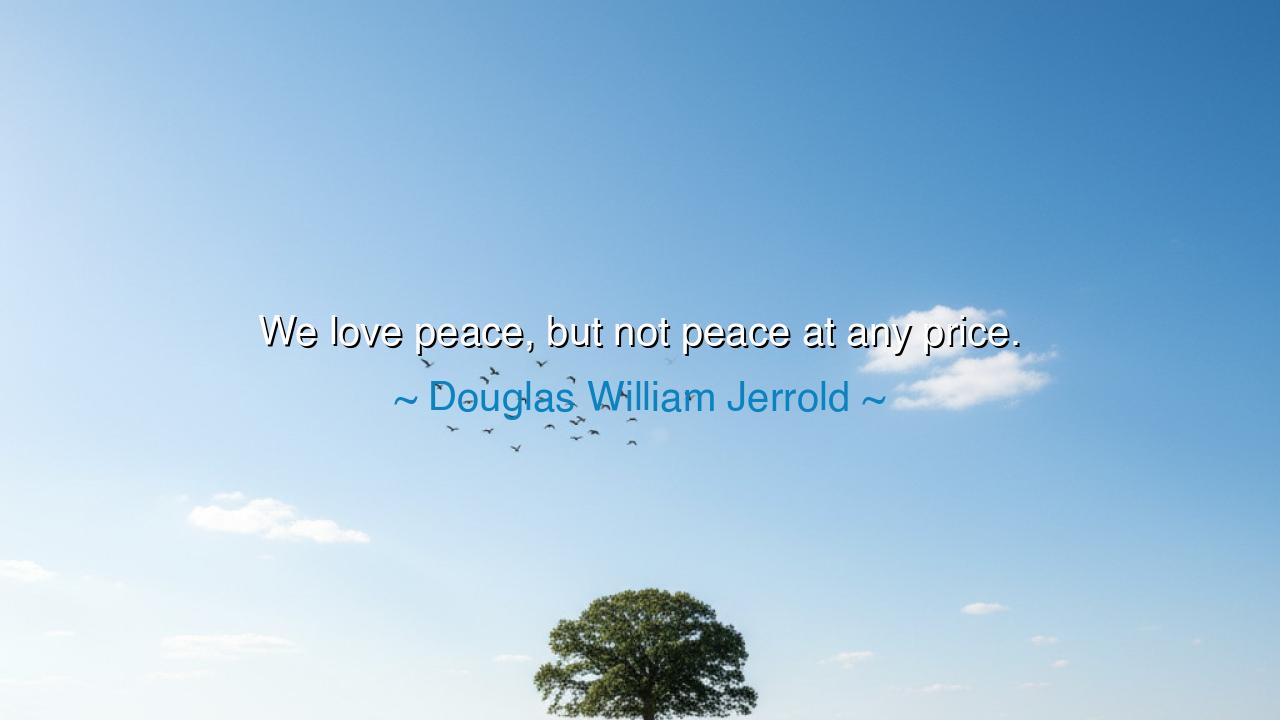
We love peace, but not peace at any price.






“We love peace, but not peace at any price.” Thus spoke Douglas William Jerrold, the English dramatist and satirist of the 19th century, and his words carry the weight of eternal wisdom. For though the human heart longs for peace, there are times when peace itself can be corrupted—when peace becomes submission, when peace becomes chains, when peace is bought at the cost of honor, justice, or freedom. Jerrold reminds us that peace without righteousness is not true peace at all, but a pale shadow of slavery disguised as harmony.
When Jerrold declares that we do not want peace at any price, he unveils a paradox: peace is precious, yet it is not the highest good. For if peace requires the surrender of conscience, if it demands the silencing of truth, if it asks us to bow before tyranny, then such peace is more terrible than war. True peace must rest on justice and freedom, otherwise it is only the stillness of a graveyard, the quiet that comes when voices are stifled and the strong oppress the weak.
History bears witness to this truth. Think of Neville Chamberlain at Munich in 1938, who declared “peace for our time” after yielding to the demands of Hitler. But that peace was bought with betrayal, purchased at the cost of Czechoslovakia’s freedom, and it lasted only a fleeting moment before the storm of war consumed Europe. The peace at Munich was not true peace—it was cowardice cloaked in diplomacy. Contrast this with the courage of Winston Churchill, who refused to accept peace on Hitler’s terms. He declared instead that Britain would never surrender, for better to face the flames of war than to live in the chains of false peace.
But there are also brighter examples. Consider the struggle of America’s founders, who loved peace but chose revolution when peace with Britain meant submission to unjust rule. They bore the hardships of war not because they despised peace, but because they knew that peace without liberty was no peace at all. And when independence was won, the peace they built was enduring because it was rooted in justice and self-rule. Their sacrifices proved Jerrold’s words: peace must be noble, not purchased at the expense of dignity.
In our daily lives, the lesson is no less powerful. At times we too are tempted to keep peace at all costs: to remain silent when we see wrongdoing, to compromise our values for the sake of comfort, to avoid conflict even when truth demands it. But such peace is hollow, for it corrodes the soul. True peace within a family, a friendship, or a community can never be built upon lies, fear, or submission. Real harmony comes only when justice is present, when truth is spoken, when dignity is preserved.
This is not a call to be quarrelsome, nor to seek strife. On the contrary, it is a call to be lovers of true peace—a peace that grows from honesty, respect, and fairness. We should strive for reconciliation, but never at the price of betraying what is right. We should seek harmony, but not by abandoning the vulnerable to the strong. For peace without justice is fragile, and peace without truth is a mask that will one day shatter.
Therefore, let Jerrold’s words guide us: “We love peace, but not peace at any price.” Love peace enough to defend it. Love peace enough to sacrifice for it. But do not love peace so blindly that you give away freedom, silence your conscience, or abandon the oppressed in its name. The highest peace is not mere quiet—it is the flourishing of souls in liberty and justice.
So let your actions reflect this wisdom. Stand firm when peace demands cowardice. Speak truth when silence would be more comfortable. Seek reconciliation, but not by bowing to injustice. For in doing so, you will preserve not only peace, but the dignity that makes peace worth having. And then, when you rest in that peace, it will not be the peace of submission, but the peace of triumph, born of truth, courage, and freedom.






AAdministratorAdministrator
Welcome, honored guests. Please leave a comment, we will respond soon